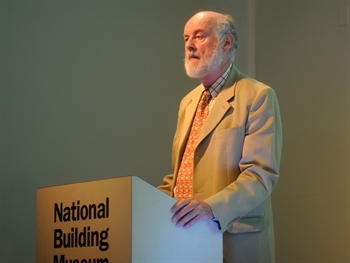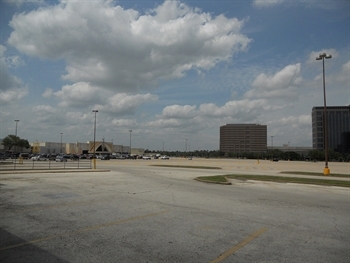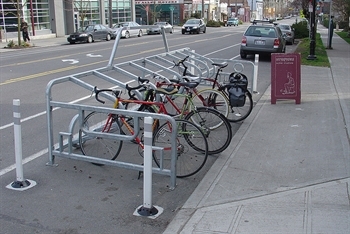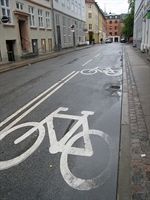
Photo courtesy of Flickr user Zach K.
Birds-eye view of a suburban Chicago mall.
See all the articles in the Solving the Parking Predicament series. >>
MPC research assistant Lena Ferguson authored this post.

Donald Shoup.
Photo courtesy of Flickr user M.V. Jantzen.
His followers call themselves “The Shoupistas.” They call him the “Jane Jacobs of parking policy,” “prophet of parking,” and “parking rock star” -- and in response he’s jokingly suggested changing his name to Shoup Dogg. Whatever you call him, he’s the name-to-know in the parking management world: Donald Shoup.
Shoup, a Yale-educated economist who is an urban planning professor at UCLA, is widely considered the nation’s foremost parking policy expert. He has long argued that getting parking pricing right matters for a host of reasons: to help manage demand for spaces, reduce traffic congestion and pollution, and create a new revenue stream to fund neighborhood enhancements.
Shoup has a three-part theory to better manage parking. First, set demand-based prices for on-street parking that ensure 15 percent of parking spots are available at all times. This solves traffic congestion caused by cruising, because those who choose to drive and pay the rate for on-street parking can quickly find a spot, while others will forgo the parking expense and park off-street (provided that garage parking is more economical) - or, even better, they’ll take transit, walk, or ride their bikes.

Near-empty parking lot.
Photo courtesy of Flickr user Bibi.
Second, Shoup firmly believes that cities must dedicate revenues from parking meters to local neighborhoods. This strategy gains support from business owners and residents for the higher cost of on-street parking and provides much-needed neighborhood improvements that people can easily see and experience, without tapping existing budgets.
Third, Shoup believes in eliminating minimum parking requirements for developers, which he says “inflict widespread damage on cities, the economy, and the environment” and are a major cause of sprawl. Minimum parking requirements create lots that don’t reflect demand and often take up more space than the buildings they are intended to serve. Most of the time, the majority of spaces remain empty, essentially wasting land that could be put to better use. Shoup recommends replacing the minimums with maximum parking requirements, which would cap the amount of parking allowed to be built.

Lakeview "people spot."
Photo courtesy of Flickr user MicheleBikeWalkLincolnPark.
Shoup’s theory of pricing and zoning has been implemented in various stages in cities around the country, including San Francisco, Old Pasadena, CA, and Oak Park, IL, which will all be profiled for this series.
City planners also are exploring new strategies to rethink parking and land use. In San Francisco, parks have sprung up from the unlikeliest of places: metered parking spaces! In 2005, Rebar Art & Design Studio took over a metered parking space for two hours and transformed it into a public space with just some sod, a potted tree and a rented bench. Their idea turned into PARK(ing) Day, a now-global event that sparked the revolutionary idea that parking spots can be much more than the patch of asphalt where you leave your car while you do something more interesting elsewhere. By 2011, PARK(ing) Day was celebrated in six continents, 35 countries, and 162 cities and created 975 temporary parks. Many cities, including Chicago, have applied PARK(ing) Day’s concept on a permanent basis, redesigning parking spaces as “parklets” for people to enjoy. Chicagoans can see and use these “people spots,” as we’ve branded them here in Chicago, in Andersonville and Lakeview. The Chicago Dept. of Transportation is planning more “people spots” for 2013.

Bike parking in a vehicle space.
Photo courtesy of Flickr user VeloBusDriver.
In Oak Park, Ill., and Portland, Ore., some vehicle parking spots instead are reserved for bicycles. Copenhagen, Denmark, spent 35 years eliminating parking spots by 2 to 3 percent annually, replacing many of its on-street parking spots with bicycle lanes. Copenhagen is now one of the largest biking cities in the world, with bicycling accounting for a 37 percent mode share. Copenhagen also converted most of its surface parking lots to public plazas. A good example is Nyhavn, a harbor-side plaza lined with shops and restaurants, which is now one of the city’s most popular tourist destinations.

Parking lane turned bike lane in Copenhagen.
Photo courtesy of Flickr user conbon33.
Better managing metropolitan Chicago’s parking spaces using Shoup’s theories and new strategies like parklets would make our region an even more inviting, livable place for residents and visitors. MPC’s Solving the Parking Predicament series will highlight parking management theories, and ways in which cities across the country are using demand pricing, zoning requirements, and a little rethinking to better manage land dedicated to parking.

Nyhavn in Copenhagen.
Photo courtesy of Flickr user Raphael Cockx